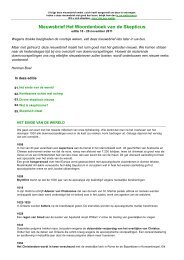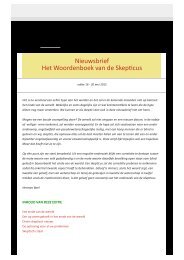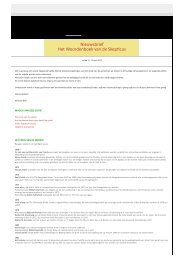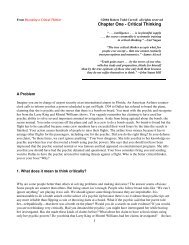A Practical Guide to Critical Thinking - The Skeptic's Dictionary
A Practical Guide to Critical Thinking - The Skeptic's Dictionary
A Practical Guide to Critical Thinking - The Skeptic's Dictionary
You also want an ePaper? Increase the reach of your titles
YUMPU automatically turns print PDFs into web optimized ePapers that Google loves.
Greg R. Haskins<br />
15<br />
Table 3<br />
Hindrances Due To<br />
Faulty Logic Or Perception<br />
Hindrance Definition Example <strong>Critical</strong> <strong>Thinking</strong> Tip<br />
Ad Hoc<br />
Hypothesis<br />
Apophenia &<br />
Superstition<br />
Argument from<br />
Ignorance<br />
Begging the<br />
Question<br />
Clustering<br />
Illusion & Texas<br />
Sharpshooter<br />
Fallacy<br />
False Analogies<br />
Forer Effect<br />
Gambler’s<br />
Fallacy<br />
A hypothesis, which<br />
cannot be independently<br />
tested, is used <strong>to</strong> explain<br />
away facts that refute a<br />
theory or claim.<br />
Erroneous perception of<br />
the connections between<br />
unrelated events.<br />
A logical fallacy claiming<br />
something is true<br />
because it has not been<br />
proven false.<br />
A fallacious form of<br />
arguing in which one<br />
assumes <strong>to</strong> be true<br />
something that one is<br />
trying <strong>to</strong> prove.<br />
<strong>The</strong> erroneous<br />
impression that random<br />
events that occur in<br />
clusters are not random.<br />
Making illogical<br />
analogies <strong>to</strong> support the<br />
validity of a particular<br />
claim.<br />
<strong>The</strong> tendency <strong>to</strong> accept<br />
vague personality<br />
descriptions that can be<br />
applicable <strong>to</strong> most<br />
people as uniquely<br />
applicable <strong>to</strong> oneself.<br />
<strong>The</strong> fallacy that<br />
something with fixed<br />
probabilities will increase<br />
or decrease depending<br />
upon recent<br />
occurrences.<br />
Psi researchers often blame<br />
the “hostile thoughts” of<br />
onlookers for adversely<br />
affecting instruments<br />
measuring the alleged<br />
existence of psychic powers<br />
Irrationally believing that how<br />
one wears their hat while<br />
watching a football game can<br />
influence the score.<br />
Believing that there must be<br />
life on Mars because no one<br />
has proved that there is not life<br />
on Mars.<br />
A man claiming that<br />
paranormal phenomena exists<br />
because he has had<br />
experiences that can only be<br />
described as paranormal.<br />
In ESP experiments, a “water<br />
witcher” using dowsing may<br />
find water at a slightly higherthan-chance<br />
rate over a brief<br />
period of time, and mistakenly<br />
assume this proves dowsing<br />
really works.<br />
Arguing that two children<br />
sharing the same bedroom is<br />
wrong because double-celling<br />
of criminals in a penitentiary<br />
can lead <strong>to</strong> bad behavior.<br />
Astrology readings, intended<br />
for people of a specific sign,<br />
can be applicable <strong>to</strong> most<br />
individuals. This effect usually<br />
works in conjunction with ‘Self-<br />
Deception’ and ‘Wishful<br />
<strong>Thinking</strong>.’<br />
<strong>The</strong> misconception that picking<br />
lottery numbers that have not<br />
yet been picked will increase<br />
your chances of winning.<br />
Put low reliance, or reserve<br />
judgment on, claims that<br />
cannot be independently<br />
tested.<br />
Recognize the difference<br />
between cause & effect<br />
versus unrelated<br />
coincidence.<br />
Do not believe a<br />
proposition simply because<br />
it cannot be proven false.<br />
Recognize when an<br />
argument assumes <strong>to</strong> be<br />
true something it is<br />
attempting <strong>to</strong> prove. When<br />
this occurs, seek<br />
alternative explanations.<br />
Understand the basic<br />
principles of probability &<br />
statistics. Recognize when<br />
numbers are being used<br />
correctly & objectively<br />
versus incorrectly & with<br />
bias.<br />
Learn <strong>to</strong> recognize the<br />
faulty assumptions behind<br />
false analogies.<br />
<strong>Critical</strong>ly evaluate if<br />
personality<br />
characterizations are truly<br />
unique <strong>to</strong> you, or could<br />
apply <strong>to</strong> most people.<br />
Learn <strong>to</strong> recognize and<br />
distinguish events that<br />
have fixed versus variable<br />
probabilities.






